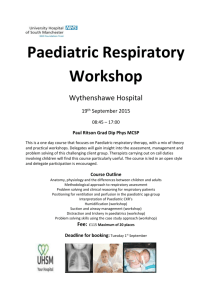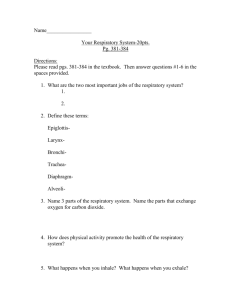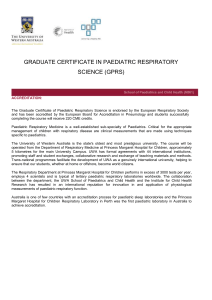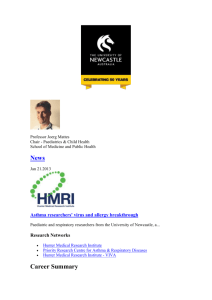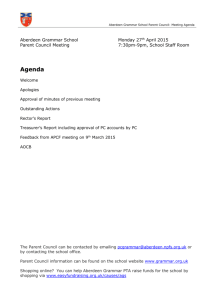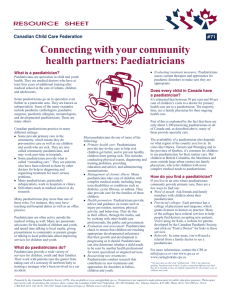Prof George Russell - June 2012 - British Association of Perinatal
advertisement
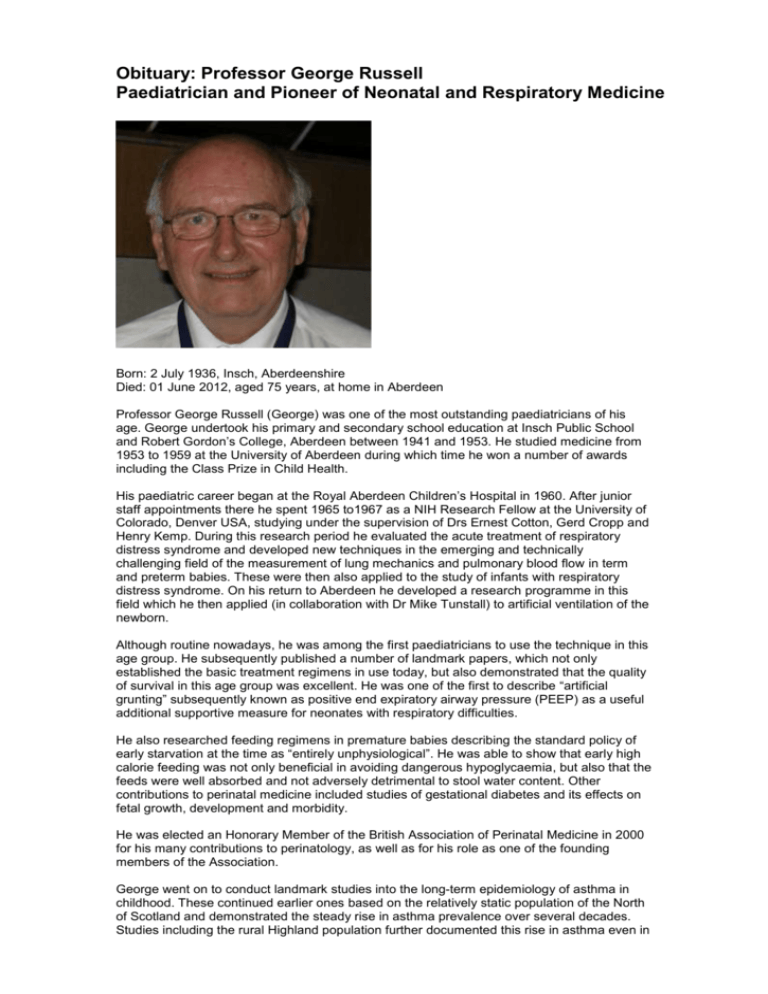
Obituary: Professor George Russell Paediatrician and Pioneer of Neonatal and Respiratory Medicine Born: 2 July 1936, Insch, Aberdeenshire Died: 01 June 2012, aged 75 years, at home in Aberdeen Professor George Russell (George) was one of the most outstanding paediatricians of his age. George undertook his primary and secondary school education at Insch Public School and Robert Gordon’s College, Aberdeen between 1941 and 1953. He studied medicine from 1953 to 1959 at the University of Aberdeen during which time he won a number of awards including the Class Prize in Child Health. His paediatric career began at the Royal Aberdeen Children’s Hospital in 1960. After junior staff appointments there he spent 1965 to1967 as a NIH Research Fellow at the University of Colorado, Denver USA, studying under the supervision of Drs Ernest Cotton, Gerd Cropp and Henry Kemp. During this research period he evaluated the acute treatment of respiratory distress syndrome and developed new techniques in the emerging and technically challenging field of the measurement of lung mechanics and pulmonary blood flow in term and preterm babies. These were then also applied to the study of infants with respiratory distress syndrome. On his return to Aberdeen he developed a research programme in this field which he then applied (in collaboration with Dr Mike Tunstall) to artificial ventilation of the newborn. Although routine nowadays, he was among the first paediatricians to use the technique in this age group. He subsequently published a number of landmark papers, which not only established the basic treatment regimens in use today, but also demonstrated that the quality of survival in this age group was excellent. He was one of the first to describe “artificial grunting” subsequently known as positive end expiratory airway pressure (PEEP) as a useful additional supportive measure for neonates with respiratory difficulties. He also researched feeding regimens in premature babies describing the standard policy of early starvation at the time as “entirely unphysiological”. He was able to show that early high calorie feeding was not only beneficial in avoiding dangerous hypoglycaemia, but also that the feeds were well absorbed and not adversely detrimental to stool water content. Other contributions to perinatal medicine included studies of gestational diabetes and its effects on fetal growth, development and morbidity. He was elected an Honorary Member of the British Association of Perinatal Medicine in 2000 for his many contributions to perinatology, as well as for his role as one of the founding members of the Association. George went on to conduct landmark studies into the long-term epidemiology of asthma in childhood. These continued earlier ones based on the relatively static population of the North of Scotland and demonstrated the steady rise in asthma prevalence over several decades. Studies including the rural Highland population further documented this rise in asthma even in such non-urban, non-polluted areas of the country. Parallel studies documented the prevalence of persistent nocturnal cough and the relationships between wheeze, cough and atopy in these populations. He also studied the effects of inhaled corticosteroids on adrenal function and growth in asthmatic children. George set up and supervised services for cystic fibrosis in his region. He was a founder member of the Scottish Cystic Fibrosis (CF) Group. He was the first to show (in 1970) that a major part of the primary pathology in CF is a result of sputum hyper-viscosity due to its excess DNA content. This finding eventually led, many years later, to the introduction of DNAse as a major treatment for the condition. He was a founder member of the British Paediatric Respiratory Group (now British Paediatric Respiratory Society (BPRS), and was given a Life-Time Achievement Award by the BPRS in 2009 for his outstanding contributions to the sub-specialty. George’s other major contributions to the study of child health were in the clinically difficult areas of recurrent headache, migraine, and chronic abdominal pain. His research publications in these subjects made a major contribution to putting the epidemiology and treatment of these conditions on a scientifically evaluated evidence base for this age group. He also had an interest in metabolic diseases, setting up and running one of the first metabolic clinics in the UK. Despite his heavy clinical workload and many research activities, he carried out major management roles in the NHS within the Grampian region. He also served as a Health Export Scheme Professor of Paediatrics, sponsored by the Royal College of Physicians of London, at the University of Riyadh during 1977 and 1978. He was elected as a Fellow of the Royal College of Physicians of Edinburgh in 1993 for outstanding contributions to Medicine. He was an associate editor of Archives of Disease in Childhood for several years and wrote many distinguished editorials for the journal on all of the subjects in which he had special expertise. He was elected as an Honorary Fellow of the Royal College of Paediatrics and Child Health, an accolade given to senior paediatricians who have made outstanding contributions to the aims and objectives of the College over a number of years. George was made a Professor in 2001. Throughout his career, teaching and training were a major priority in his professional life. Numerous academic and specialist paediatricians throughout the United Kingdom and abroad owe their enthusiasm, foundations in the field, and much of their academic success to his inspirational research teaching and leadership. He was forever generous with his time and always went the extra mile, spending hours with his research fellows and trainees in support of their writing of papers. Even after retirement from the NHS his appetite for research and academic activities continued unabated. He is survived by his wife, four children and three grandchildren. Robert Dinwiddie
